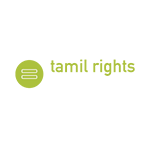The Tamil Rights Group (TRG) brings together victims, activists, practitioners, and experts from home and diaspora Tamil communities, and well-wishers who actively seek to take forward the transitional justice process despite the recent unilateral withdrawal of Sri Lanka from its United Nations Human Rights Council (UNHRC) obligations it first co-sponsored in 2015.
The current regime is responsible for conducting war on its people that violated International Humanitarian Law and International Human Rights Law and remains unwilling to account for all grave international crimes, the conduct of war, forced disappearances, and missing people in their custody.
The Sri Lankan state is notoriously known for decades of failed domestic accountability mechanisms and thrives on a culture of impunity. The repetitive inactions of the judiciary to protect the culpability of the Sri Lankan state have demonstrated their unwillingness to deliver justice and accountability to victims of human rights abuses and serious violations.
Sri Lanka’s decision to go back on its commitments and the reversal of the meagre progress on transitional justice leaves us with no alternative but to call for an independent international justice mechanism from the UNHRC. The UNHRC requires a robust response by the Council, including steps towards the creation of an accountability mechanism to ensure the victims of the nearly three-generation-long conflict get the justice that is owed to them.
The TRG is also passionate about upholding UN conventions, and protecting natural rights and human rights. The recent assault on parliamentary democracy, shrinking space for civil society activism, attack on political dissension and intimidation of Tamil journalists have added further setback for the survival of Eelam Tamils facing structural genocide amidst the growing military interventions of occupied forces. TRG also notes the increased discrimination and racial targeting of Muslims in recent years, the rise of militarism and police brutality, and increased suppression of dissent and basic freedoms.
The intensification of national oppression of Eelam Tamils further warrants the need to establish TRG at this historical moment. It is dedicated to achieving justice and accountability through transitional justice processes and lawfare. The TRG is also a space for active collaboration between those who have been at the forefront of the Eelam Tamil political struggle, young activists, and advocates, thus bridging the gap between different generations.
We made a conscious decision not to deliberate on political solution as the onus is primarily on those who struggle for freedom and the people in the homeland. Of course, every member of Tamil freedom struggle has the historical duty to respond to the united resolve of the Eelam Tamil struggle and their solidarity movement but also heavily relies upon local economy, geopolitical situation, and UN intervention as at present.
